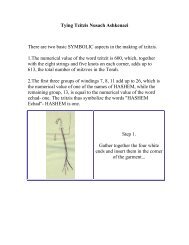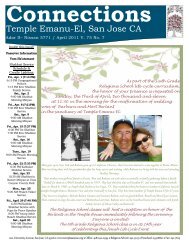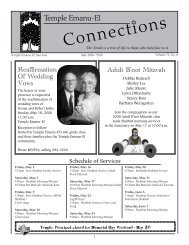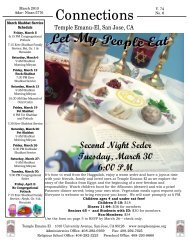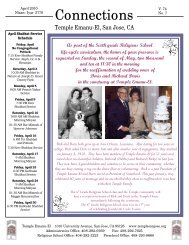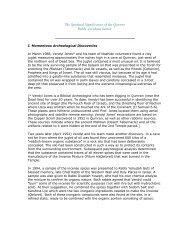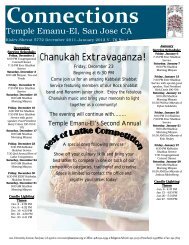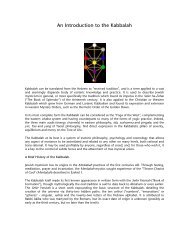From Rabbi’sDesk2Relating to Shavuotas a Reform JewThe holy day of Shavuot iscelebrated on the 6th ofSivan. This is the time thatJews traditionally celebrateMoses’ receiving of theTorah on Mount Sinai. It isone of the three PilgrimageFestivals (Shalosh Regalim),when our ancestors wouldtravel to Jerusalem withofferings of first fruits inthankfulness for a successful harvest. The other two PilgrimageFestivals are Pesach and Sukkot. Shavuot is known by several names:Chag Ha-katzir (Festival of the Grain Harvest), Chag HaBikurim(Festival of First Fruits); Zeman matan toratenu (the season of thegiving of the Torah) but the word Shavuot actually means "weeks"and it celebrates a "week of weeks" (7 weeks, or 49 days) followingthe week of Pesach. At the conclusion of the second seder, we begincounting the omer, marking the beginning of the wheat harvest. OnShavuot the barley harvest begins.Pesach and Shavuot are interconnected. During Pesach, wereconnect to our liberation from the land of Egypt (Mitzrayim, theplace of narrowness or constriction) to become a people inrelationship with God.According to the Rabbis, the Torah was offered to a variety ofdifferent peoples. But they did not like the conditions. When Godoffered the Torah to the Israelites, they said "na'aseh v'nishma" (wewill do and we will hear). In other words, the action precedes theunderstanding. Just as on Pesach, we should consider that we wereliberated from Egyptian bondage, so too on Shavuot, we should allconsider that we stood together at Sinai and received the Torah as aguide for our lives.Traditional Jews believe that the Torah was actually handed toMoses at Mt. Sinai. As Reform Jews, we take a different approach.We do not take the story literally, but more metaphorically. Torahwas written by our ancestors over the course of many periods oftime. It was codified and organized, and handed down fromgeneration to generation, both as written and oral tradition. But thatdifference in interpretation in no way decreases the significance ofthe holiday. What Shavuot does for us is provide anotheropportunity for connection ... to the <strong>Temple</strong> in ancient days, ourhistory, our traditions, our own congregation, and to our ownidentity as Jews.All three pilgrimage festivals are tied to our agrarian roots. Byobserving them here (or wherever we are), it connects us both to ourpast, to nature and the seasons of the year, and to the Land of Israel.What is also remarkable is that each of these festivals also provides atime during the year for self-examination. On Sukkot, as wecelebrate our first fruits, we consider our basic needs in life, thosethings that we so often take for granted. Sukkot is especiallypowerful after we have gone through a process of Teshuvah, of takingresponsibility for our actions and starting with a clean slate. AtPesach, we have an opportunity to look at the Chamatz, "leavening"in our lives, checking on what is "puffing us up," how we areenslaved and what we might need to do to free ourselves. OnShavuot, as individuals we examine our covenantal relationship toJudaism, because we are Am Brit, a people of the covenant.In the Reform movement, Shavuot is traditionally the time whenyoung adults (in most cases 10th graders) affirm their connection tothe Jewish tradition. At <strong>Temple</strong> <strong>Emanu</strong>-<strong>El</strong>, the Erev Shavuot andConfirmation Service is the culmination of a year of study, duringwhich time our students examine what it means to be a Reform Jew;what is God and how we cope with death. This year we havethirteen outstanding young people who have spent the year togetherand will be sharing their views on these topics. Our goal is to alsoconfirm our Jewish faith, by being present at our ErevShavuot/Confirmation service, we too are afforded an opportunity tocontemplate what we believe.On Shavuot, we hear two scriptural readings. One is from the Bookof Ruth (because the story of Ruth takes place during the barleyharvest, and because the rabbis, felt that Ruth's acceptance ofJudaism paralleled the Israelites’ acceptance of Torah). The other isthe Ten Commandments from our Torah.I hope you will be with us on Thursday, <strong>May</strong> 28 at 7:00pm toexperience this wonderful opportunity to reflect on your belief andto celebrate with our Confirmands and their families.As on all the pilgrimage festivals, there is an additional Yizkor(memorial) portion added to the Shavuot morning service. TheYizkor service is not just for those who have lost someone dear inthe past year. It is for anyone and everyone because the connectionto those who have gone before us is such a strong part of our Jewishtradition. The Shavuot morning service will be on Friday, <strong>May</strong> 29, at9:00am in the Chapel.Shavuot is another example of how the Jewish calendar offers usopportunities throughout the year to reflect on our lives and to be apart of our extended family, our community. <strong>May</strong> this be awonderful Shavuot for all of us.L’Shalom,Rabbi Dana L. Magatrabbimagat@templesajose.org
JewishLiteracy3This month is the Festival of Shavout, the Spring Harvest Festivalthat celebrates the handing down of the Torah, the scroll of JewishLaw, on Mt. Sinai. The way we celebrate this holiday in oursynagogue is similar to the way it is being celebrated in Israel andthroughout the world; it’s a parallel experience. This globalcelebration is being held in synagogues everywhere, whether in theGreat Synagogue in Jerusalem, Altashul in Amsterdam or LincolnSquare in Manhattan. The concept of Shavout is an ancient traditionthat carries over to our heritage today. The concept of celebratingone’s heritage and anniversary dates of special occasions is ancientand trans-cultural. When we honor our heritage we demonstrate thevalue of traditions. This builds a strong foundation for the future.By your participation in this year’s festivities you demonstrate yourpride in being part of the Jewish people’s rich historical landscapeand heritage.The flowers used to decorate synagogues are a symbol of spring,rebirth and hope as well as a reminder of the refreshing aroma ofthe earth and creation. We are awed by the significance of whenGod gave each and every Jew the gift of the Torah, which has been alifeline to the nation through the generations. The teachings and thewisdom of the Torah are considered a gift to the Nation of Israeland the world, vital for spiritual existence and survival.Millions were present during the historical event whereby we are toldthat all the Jews and the souls of those individuals who would beborn in the future were present as well. It was a multi-media show, soto speak, and probably in today’s terms, comparable to the openingnight of Spider-Man, Harry Potter, The Mummy Returns, Planet of theApes, Star Wars Episode I, and the excitement that all theseblockbusters provided for the masses. On opening night, Spider-Manwas hailed by the press as the year’s biggest money-maker andsuccess by shattering just about every opening night box officerecord. In modern days, this movie has been the greatest productionever witnessed with the largest viewership in history in a single night.If you compare this event to the dramatic event of when the peopleheard the voice of God and there was thunder and lightning andsupernatural and unprecedented occurrences, over 3,000 years ago,this was an even bigger and more comparable and impressive eventin history because there were many more individuals witness to it.The script and the production of the event on Mt. Sinai has beencontinuously re-enacted for over 3,000 years every Shavuot. Whilemovies may lose their potency and power over the courseof a few months or years, the event of the giving of the Torah andGod’s communication to man and to His people is still consideredthe #1 best seller. There is no other historical event that has evertopped it. It is of utmost eternal significance for us as a peopleand individually.The Torah is our nation’s treasure. We store it carefully in our arks.So many people in this country treasure antique objects, objects ofcertain value that are determined through the following criteria:completeness, endurance, increased value, detail of the handiworkand enduring beauty. In comparison with the most treasured,valuable antiques in the world, the Torah’s values are timeless andeternal. The beauty of words is one of the ages’ most valuable andpractical antiques, so to speak. The Torah, as we said, was given tous over 3,000 years ago, which gives it the aura of being anincredible antique artifact that has been preserved and respectedthrough the ages.Another illustration that helps us to see the timelessness of theTorah is a comparison to the Tale of Peter Rabbit by Beatrix Potter, abeloved children’s classic book that many have read. It has had arecord 250 printings in 35 different languages. While that is certainlysomething to be amazed at, think about this--the Torah has beenthrough perhaps hundreds of thousands of reprints--every time ithas been rewritten on a scroll though the centuries. It has beenread and cherished all over the world for hundreds of generations.The Torah has been translated into countless languages all overthe world.Each year, Jews celebrate the anniversary of this historicallysignificant event--the giving of the Torah. Some of the ways inwhich we re-enact and role-play is through a dramatic re-enactment--using props, scenery, costumes, liturgy and a script. These are theelements of a production. So if we break down the components, theprops are the food that we eat, the dairy products, the candles thatwe light, and the books that we hold in our hands and read. Thecostumes are the yom tov clothing that we dress in and the sceneryis how we decorate our synagogues and homes with flowers andgreenery, and how we try to put our environment in spic and spanshape. The liturgy is the special songs we sing and prayers to theAlmighty that works to create a certain ambiance and tells a storylike a musical play. During the dramatic presentation there is adialogue and exchange of ideas between us and our prayers to God.Some of it is like improvisational theater where people express theirviewpoints off the cuff.All of these pieces help us to spiritually step into the mindset andrecreate the drama. Our tradition encourages us to pull an all-nighterof learning to commemorate and immerse our minds in thishistorically significant event. This helps to intensify our knowledgeand review our history spanning more than 3,000 years.In Israel there is a very powerful and moving tradition of Jewsmigrating en masse to the Western Wall as the sun rises for theShacharit (morning) prayers. The ground is packed and the sound ofthe multitude of prayers in unison can touch the depth of one’s soul.Here too in our close-knit and loving community, we are creatingour own special feeling of unity and purpose through ourparticipation and observance of this sacred time.CHILDREN’S SECTION – There is a portion of the servicewhen the Ten Commandments were read from the Torah fromthe book of Sh’moth and the children gather around the bimahcarrying baskets of fruit and adorned with flowers. This is a customfor the festival of Shavuot. A blessing is given to the children.History reflects not only where we have been but also where weas a nation, state and country are going. Our children are blessedto have the opportunity to fully appreciate the rich history andculture Judaism offers.Our children are beautiful and special. We hope through attendancein synagogue with your friends and family, you will have positive,meaningful, fun times and love being Jewish. Hopefully days liketoday will be cherished Jewish memories etched in your hearts foryour entire lives.Children serve as a comforting reminder that the love andknowledge of Judaism is strong. You are showing how proud youare to live in a country so full of choices and creativity that allowsyou to learn and live and develop your Jewish identity.



